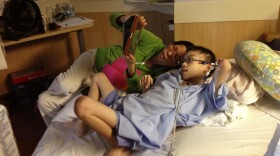
Amanda Aronczyk
Amanda Aronczyk (she/her) is a co-host and reporter for Planet Money, NPR's award-winning podcast that finds creative, entertaining ways to make sense of the big, complicated forces that move our economy. She joined the team in October 2019.
Before that, she was a reporter at WNYC, New York Public Radio, where she contributed stories to Radiolab, On the Media, United States of Anxiety, The Brian Lehrer Show and more. Aronczyk covered science and health, and she fondly remembers collecting saliva from voters to measure stress, corresponding with the Unabomber and using nose swabs to solve a classic office mystery: who came to work sick? She was also the lead reporter on the award-winning 10-story companion series to PBS' "The Emperor of All Maladies," presented by NPR and WNYC.
Aronczyk also teaches audio journalism at the Newmark Graduate School of Journalism at CUNY.
-
Many colleges are doing remote learning, and much of a college's budget depends on income from students being on campus. Colleges must change how they work, and some may even close.
-
Snakebites are common, but anti-venom can be hard to get. One doctor is trying a new solution, with help from a former rock star.
-
Prisoners have a constitutional right to health care, but inmates at Angola prison in Louisiana are suing for medical shortfalls that have allegedly caused "needless pain and suffering."
-
When Giselle decided to apply to medical school, people told her to hide the fact that she has struggled with anxiety, depression and a suicide attempt. She thinks it will help her be a better doctor.
-
A woman's family is stuck with medical charges for care she received after being diagnosed with pancreatic cancer. Negotiating relief from the bills has become a part-time job for her daughter.
-
A drug that's effective in patients with certain forms of melanoma is being tested as a treatment for other cancers whose genetic code contains an identical mutation.
-
Cancer treatment for kids has changed dramatically since the 1960s. Back then, doctors experimented with approaches that seemed promising but were also potentially toxic. Some survivors look back.
-
After being diagnosed with cancer, people often ask one question first: "How long do I have?" Doctors usually overestimate the time, and patients often don't understand it's a range, not one number.
-
When a child falls ill with cancer, many of the drugs that might help are either experimental or unapproved for use in kids.
-
Offering a homeless person an apartment with access to a doctor and social services may be cheaper than paying for emergency room visits and jail or shelter stays. But should Medicaid help with rent?







